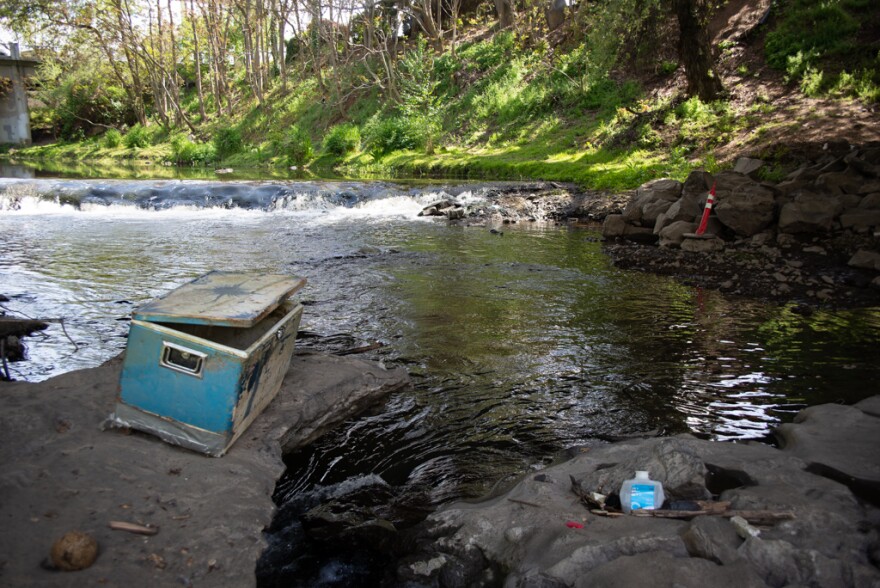In early March, Jackson County and Medford police temporarily stopped clearing homeless camps from the Bear Creek Greenway, an 18-mile long bike path that stretches from Central Point to Ashland. The Jackson County Emergency Operations Center started directing homeless resources to the area, including meal deliveries, portable restrooms, EMT visits, and a medical van for check-ups.
At the same time, the county officials began advising shelters to decrease the number of beds they offer to make room for social distancing. Some shelters have stopped operating altogether. And the city of Ashland denied a proposal to establish an official campground for unsheltered people.

Some local officials say they're concerned that the county lacks the means to safely run an official campground for unsheltered people in the middle of a pandemic.
"We are really developing the mature social service infrastructure that we need to do stuff like this," says Oregon Rep. Pam Marsh, who is working with county agencies on homelessness issues. "I'm hopeful that we will continue to grow this capacity, but as a small rural community, there's a huge challenge in having the social service response that we need."
Instead, county agencies are focused on bringing some food and medical care to the Bear Creek Greenway. Many people who are camping there say they're grateful that the police and sheriff’s deputies have stopped clearing out their belongings, but they question the county’s motives.
“They want people to stay on the bike path here to keep the sickness here to deplete us,” says Sahailee Savage. “They want us gone. They want the homeless gone, but if they want the homeless gone, make a place for them to go.”
Savage turned 18 this spring. She has been camping largely on her own since she was 15, when her mother entered a transitional housing program for drug abuse. The state put her brothers into foster care, and Savage went to live with her biological father until he kicked her out. That's when she headed to the Bear Creek Greenway and got a couple of dogs to keep her safe. Life hasn’t been easy since.
“You wake up to a cop telling you to move,” Savage says. “I was 17, 16, homeless, and I’ve had cops come up to me — they’ll nudge you with their foot and say, ‘Get up. Gotta go. Pack your bags.’”
Savage says all she needs right now is a stable place to live with the dogs that have been with her for years, but she hasn’t been able to find that. Although the police aren’t clearing camps right now, she says it’s still an unstable place to sleep, since she’s always afraid of someone stealing her stuff.
“If there was a designated place where you could camp, I would have already been out of homelessness,” she says. “If I could camp just long enough to get a job and get some money, anything, I could be out of it.”
But Jackson County officials are opposed to establishing an official campground for unsheltered people.
“When they’re all close together, they’re all going to be talking a lot, they're going to be gathering in groups, and the likelihood of being in proximity which helps spread this disease only increases,” says John Vial, director of the county emergency center and formerly the director of the county parks and roads departments.
Jackson County Sheriff Nathan Sickler says his deputies might start clearing camps from the greenway again in June. It's not clear what will happen with the people camping along the greenway after that.

By contrast, some other Oregon counties and cities worked quickly during the onset of the coronavirus pandemic to establish additional shelters for people who are homeless. The city of Portland established three campgrounds for unsheltered people. Multnomah County has opened shelters in public buildings like the Oregon Convention Center to allow people to sleep safely and practice social distancing. About 220 county employees who can’t work from home are helping with that effort, and the county has hired additional temporary staff. If someone at a shelter becomes sick, the county or the city of Portland provides a hotel room where they can quarantine.
“We know that people who are experiencing homelessness are disproportionately older, have disabilities, and are some of the most vulnerable to the spread of this pandemic,” says Multnomah County Board of Commissioners Chair Deborah Kafoury.
It’s unclear how much money Jackson County is investing in providing homeless resources to the Bear Creek Greenway. Steve Lambert at the Jackson County Emergency Operations Center didn’t respond to multiple requests for information, and the Jackson County Board of Commissioners office also didn’t respond to a request for information.
The city of Ashland is spending $100,000 in Community Development Block Grant funds — as well as $3,500 in Affordable Housing Trust funds — to temporarily house high-risk unsheltered people in hotel rooms. The nonprofit Options for Helping Residents of Ashland is managing that program in which 45 hotel rooms are available for people who may have a high risk of developing serious coronavirus symptoms due to age or underlying health conditions.



